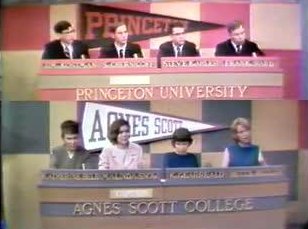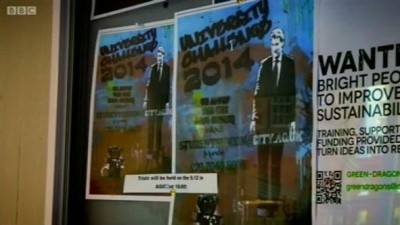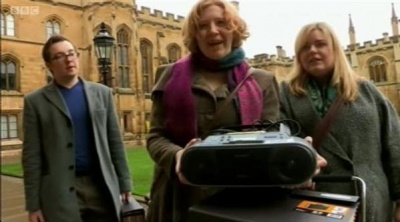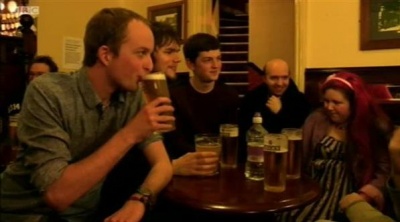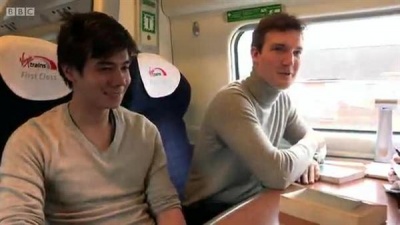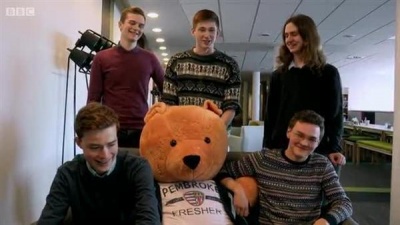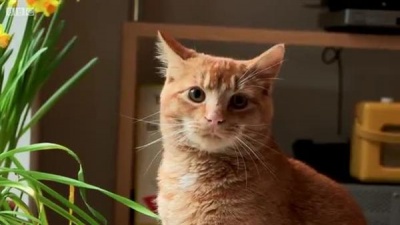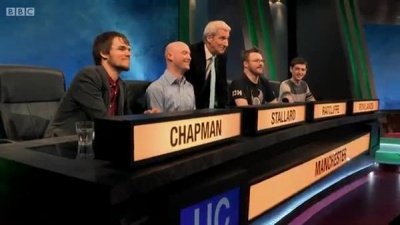Weaver's Week 2014-07-20
Last Week | Weaver's Week Index | Next Week
Some of the competitors on this year's series weren't born when the revival started.
Contents |
University Challenge
Class of 2014, 7-8 July
Prior to the new series, BBC2 put out a two-part documentary about its top-rated student quiz programme hosted by a former Newsnight presenter.
University Challenge has been going for a long time. "It's as popular today as it was when it was created in 1962," claims the voiceover by Richard Osman. This is difficult to prove, but sounds plausible – about 5% of the country sees the show, we can believe that 5% saw the tournament in its Sunday afternoon slot back then. We later learned that University Challenge was much more popular in the mid-1960s - see the next Week
The rules of the show are static: answer a buzzer question to qualify for bonuses. Curiously, the documentary doesn't tell us about the programme's antecedent, the General Electric College Bowl. Granada Television pilfered the idea from the NBC show. Starters on the buzzer, bonuses for the successful team, a live announcer, even the team-on-team shot. Granada has had to include a disclaimer in the credits for the last half-century.
Back in the 1990s, the choice of team was simple. The organiser went to the college bar, and picked people who could beat the quiz machines. This isn't actually such a bad method: it generates a team with a good all-round knowledge, with grit and determination, and it encourages decently sociable people. The sort of person who will spend Friday night in their dorm room with textbooks won't apply, and they might not look quite so good on screen.
These days, things are more methodical and rigorous. We see students at City University of London answer questions on six rounds – four parts general knowledge to two parts science. The five highest scorers qualify, the highest is nominated as the captain. The risk is that they're picking teams without regard to a good blend – a historian, a physics / maths person, a literature student all seem to help. After this piece, we don't see City again.
They do something similar at Churchill Cambridge. We're also introduced to the Trinity Cambridge team, who wax lyrical about the beauty of their college. They wax lyrical, and at some length. Did we really need to see a four-minute profile?
And did we need to hear almost ten minutes on Manchester Uni? The team called by the voiceover "the team everyone wants to beat" are gathered in a pub alongside last year's team and some previous competitors? Actually, yes; we learn of Stephen Pearson, the coach who selects a rounded squad, trains and coaches the side. And wants to seek revenge on Magdalen Oxford, also the subjects of a long profile.
There's about 40 minutes on the Amazing Travelling Audition Boxes, complete with an antique CD player to play the audition quiz. None of these high-tech MP3 players! The quiz is 40 questions, each player answers individually, any one player who gives the right answer gets the point for their team.
The producers say that they do need people who read atlases and dictionaries for fun, and who are big fans of the programme. We're also assured that the producers are looking to cast characters if they can. "It's an entertainment programme," they protest. They say that it's produced at Media City in Salford, except we know this is a fib: ITV's offices are in a block over the canal in Trafford borough. These things matter!
The documentary talks about the positive publicity, how the press swooned over Gail Trimble for being in possession of a brain while female. Just as the press had swooned over Daisy Christodoulu, just as the press had swooned over Freya McClements and over Sarah Fitzpatrick in their years. It talks about lifelong friendships, contestants and families meeting, forged in the heat of the studio. Curiously, the documentary doesn't mention the stream of abuse hurled over the internet every Monday, most of it misogynistic, much of it vile, all of it entirely regrettable.
This documentary was split into two parts, each an hour long. As much as we enjoy a good student quiz, we found the show repetitive, it emphasised the bits it wanted to talk about and glossed over some of the bits they'd rather not talk about. Such as, the final selection process. "We put the teams into categories, and then concentrate on the teams that have scored best." It's a factual statement, it conceals as much as it reveals. The whole segment is complete in less time than yesterday's hagiography of Magdalen Oxford.
This column has long had a suspicion that the producers have quotas. Our research suggests the target is five Oxford, five Cambridge, two London, four redbricks (established before World War I), a couple of plate glass universities (mostly 1960s establishments), a Scottish and another Celtic university, and precisely one former polytechnic. There's wiggle room, at least seven slots are open to good or interesting institutions, and the producers can vary their quota. We can assume that last year's seven Cambridge colleges won't be repeated.
We have no objection to the producers making good television, so long as they do make good television. We have no objection to the producers making a quality quiz, so long as they do make a quality quiz. All too often in the past couple of years, we've found ourselves in despair as yet another half-hour ticks by between Boring College Oxbridge and the Redbrick University of Some Tedium, neither good television nor good quizzing.
Did we say this documentary was repetitive? Here's that profile of the Trinity Cambridge side again, learning that they're on the show. Pembroke Cambridge are in, Sheffield are in, so are Sussex, and the LSE, and the Courtauld Institute of Fine Art, but Churchill Cambridge haven't made the grade. "The standard this year in Cambridge was so high that you guys missed the cut." Edinburgh also missed out, Manchester The Team Everyone Wants To Beat are in, so are Bristol, Brasenose Oxford, Leicester, Bath, and a couple of others uncredited.
And so are Open, the first appearance for the distance learning university in more than a decade. There have been credible reports that Open were blackballed by the production staff, possibly related to unsubstantiated claims that some students only studied at Open to appear on University Challenge. We're glad that this isn't going to happen in the new series.
Who else is in? Oxford Brookes, St Anne's Oxford, St Andrews, Selwyn Cambridge, another that wasn't credited. And Magdalen Oxford are going to be in the draw for the first round. It's curious that the three sides we concentrated on last night, the ones that hogged a third of the programme, are all in the draw.
"They're preparing for the toughest quiz in Britain," claims the voiceover. Brilliant! Not only will the winners be crowned University Challenge champions, but they'll then battle amongst each other to win The Krypton Factor. The past masters are talking about preparation – pub quizzes, buzzers. Some teams are firing question at each other, others are reading abridged versions of Little Billy Shakespeare and Charlie "Fingers" Dickens. There's a question about Little Billy every frickin' week.
The producer says that they want the questions to be interesting in their own right, so that hearing the question and the answer elicits "Ooh, that's interesting" more than "Meh." To give credit, we reckon that most of the combinations have something. But so do the questions on The Chase, and on Tipping Point, and on Ejector Seat. Unlike University Challenge, all of these shows have short and snappy questions, none of the florid around-the-houses witteration.
Some of the past masters suggest there is a technique for buzzing, as soon as the brain says "yeah, got the answer" but not necessarily exactly what the answer is. And there's a bit of give in the buzzer: they don't sound until properly depressed. Magdalen and Queen's of Oxford have a buzzer quiz. So do Manchester The Team Everyone Wants To Beat, in a match against their own alumni.
Yadda yadda yadda mascots. A large stegosaurus helped Bangor to the semi-finals two years back, and a live cat would be an unusual addition to the team.
"Their once-in-a-lifetime opportunity to appear on Britain's longest-running and most-respected quiz show." Oh, excellent! The winners will take on David and Myfanwy in a special edition of Round Britain Quiz, over twenty years older and so much cooler than UC. And so to the studio, lots of shots of students on the train (or the coach). Then to make-up, and making sure the nameplates are spelled correctly. Meeting the opposition backstage, and the obligatory photo with Jeremy "Thumper" Paxman.
Did we learn much from this? There's probably enough to confirm our long-held college quota theory. There's enough to suggest that the producers book teams for good television as well as good quizzing. And there's enough to suggest that there won't be radical reform. We'd like some shorter starter questions. We'd dearly like to not have the interminable quarter-final stage: instead, 27 teams, nine groups of three, group winners and a couple of runners-up go to a straight knockout. Make every match important.
We must also note that University Challenge has gently and gradually increased its ratings over the past decades. Slightly less than 2 million people saw the matches in early 2002. Slightly more than 3 million saw the matches in early 2014. People watch this programme, it's stable and secure, it's a returning hit. Doubtless it exposes people to BBC2, introduces them to a channel they might otherwise skip over. We cannot deny that University Challenge is a hit, and has become a cultural institution.
York and Durham and Liverpool are in, we see in the final moments, so are a dozen sides not named in these two hours. "It's gonna be a pretty damned good series," claimed the producer. We'll come back to that claim in about nine months.
Heat 1
All of which brings us to the first heat, between Manchester The Team Everyone Wants to Beat and Selwyn Cambridge. As we knew, Manchester was represented by Edmund Chapman, Matthew Stallard, John Ratcliffe, and Charlie Rowlands. Selwyn College's team was Afham Raoof, Hannah Warwicker, Joshua Pugh Ginn, and Charles Cooper. Manchester got the first starter (1914) and by the first visual round (really long railway trips) they led by 65-20. Selwyn mounted a comeback, briefly securing the lead.
Manchester were thrown a set of bonuses on rare elements linked with conflicts. The setup was topical and promising, but the question was nothing more than a potted biography of each substance. "Atomic number 74, it's used in light bulb elements."
"We're going to play you some music used as telephone hold music. This is Harrow borough council for complaints about roadworks." Give Paxman a comedy script and he'll deliver it with relish.
- Q: Listen carefully. The names of a canal that links the Baltic and the North Sea, the longest river of Africa, and the capital of Ukraine may all be made from the letters of the name of which SI base unit?
And that is why we really dislike University Challenge sometimes. These are swerve questions, ones that cannot be deduced from the opening statement, or from the opening two statements, but absolutely have to be completed. Manchester suffered a penalty for an incorrect interruption. An interesting question for the viewer even if they didn't know the Kelvin, an unfair question for the player.
We viewers got lucky, the sides were level with three minutes to play, effectively a best-of-five penalty shootout. Prolonged conferring and another missignal means it's only a best-of-four, and Selwyn wins by 190-160. Selwyn wins!
James Brindley! Michael Bolton! Anna Ford! LS Lowry! John Rylands! Noel Gallagher! Can you hear us, Noel Gallagher! Your boys took a hell of a beating!!
Manchester isn't out of the competition; their blokes are almost certain to return through the repêchage for high-scoring losers. For Selwyn, the glory of seeing Manchester The Team Everyone Wants To Beat beaten.
This Week and Next
We're sorry to report that Gerallt Lloyd Owen has died. For 32 years, he was the judge on Y Talwrn, the Welsh-language poetry contest.
Elsewhere in the game show fan world, Bother's Bar has been packed. They've notes from the pilot of interact-o-quiz You Against the Nation, and from an edition of Name That Tune.
On the Contestant Calls page, we hear about "Relatively Clever". Producers seek "families of two children (aged between 12 to 16, preferably siblings) and two adults (parents, grandparents, aunts or uncles) who have a good grasp of general knowledge." Filming's in the last week of October. Lines are also open for the next series of Tipping Point.
We won't discuss Big Brother in detail until the end of the series, but must note the entry of Zoe Birkett into the series. Yep, the same Zoe Birkett who finished fourth on Pop Idle in 2002, performing alongside Will, Darius, and The Annoying One. 10.16m people saw that performance, beating the 10.01m who saw Kate Lawler triumph in the Big Brother final that July.
BARB ratings for the week to 6 July.
- World Cup 2014: Netherlands vs Costa Rica was the most-seen show, 8.4m hoped something interesting would happen. (SPOILER: it didn't.) Celebrity Masterchef the top game show with 4.35m.
- All Star Mr and Mrs played to 3.3m, and Tipping Point Lucky Stars to 3.1m. The Chase had 2.4m on Thursday.
- Mock the Week had 2.05m viewers, 8 Out of 10 Cats Does Countdown took 1.75m, and Celebrity Deal or No Deal 1.45m.
- Big Brother peaked with 1.5m on Wednesday; the total for the week's seven episodes was 9.25m.
- 631,000 for Only Connect, with 390,000 seeing an old Celebrity Juice.
A quiet week, with BBC1 becoming the Commonwealth Games station from Wednesday night. The one new game is Dragons' Den (BBC2, 8.30 Sun). As ever, ITV has embargoed the players on Tipping Point (Sat 7.30), but we're sure that we won't be in the lonely hour.
Photo credits: Moses Read & Cleary, Granada TV.
To have Weaver's Week emailed to you on publication day, receive our exclusive TV roundup of the game shows in the week ahead, and chat to other ukgameshows.com readers, sign up to our Yahoo! Group.


